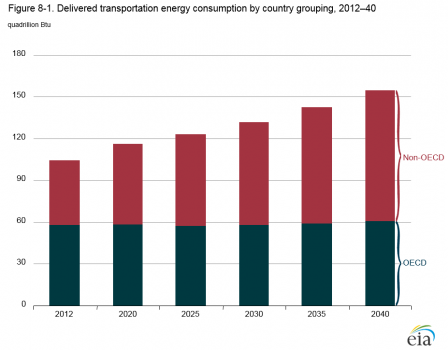Global Context for Promoting Cleaner Fuels and Vehicles Worldwide
Today, transportation demand is growing rapidly in developing countries. This, combined with rising personal vehicle ownership, is causing significant impacts on urban air quality and greenhouse gas emissions. For example, transport is potentially one of the biggest sources of carbon dioxide (CO2) and particulate matter pollution, especially in cities.
Outdoor air pollution in the form of fine particles contrinbutes annually to over 3.2 million premature deaths worldwide and now ranks among the top global health risk burdens. [reference: Lim, et. al., Global Burden of Disease Study 2010, Lancet, Vol 380 December 15/22/29] The World Health Organization (WHO) study, Ambient air pollution: A global assessement of exposure and burden of disease (PDF) (121 pp, 5.41 M, About PDF) Exit, reports that 92% of the world’s population lives in places where the air quality levels exceed WHO limits.
 Figure: Shows the increase in energy consumption by transport in non-OECD countries over time. Source: EIA International Energy Outlook 2016, Chapter 8.
Figure: Shows the increase in energy consumption by transport in non-OECD countries over time. Source: EIA International Energy Outlook 2016, Chapter 8.